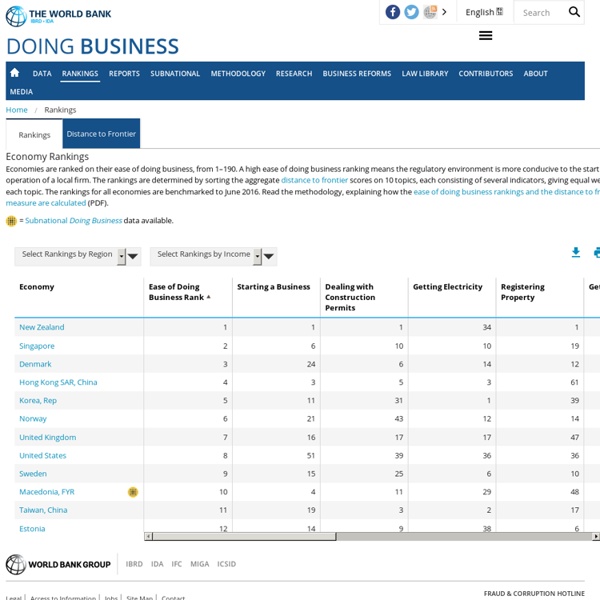



http://www.doingbusiness.org/rankings
Top 10 Thinking Traps Exposed Our minds set up many traps for us. Unless we’re aware of them, these traps can seriously hinder our ability to think rationally, leading us to bad reasoning and making stupid decisions. Features of our minds that are meant to help us may, eventually, get us into trouble. Here are the first 5 of the most harmful of these traps and how to avoid each one of them. How to Say Something More Powerful than - Hello - to a CEO I should warn you that there are some differences between selling to upper-level management and those further down the chain of command. While most customers at any level care about increasing sales and decreasing expenses, those in the upper ranks have additional concerns … by Michelle Nichols
Top 10 Logical Fallacies in Politics The human brain is wired all wrong. Those not versed in logic are blissfully unaware of how much our brain messes up the most basic of arguments, leading to the mess of random thoughts, non-sequiturs, cognitive dissonance, white lies, misinformation, and syntax errors that we call consciousness. Luckily, there is one place where all of these logical misteps can be exemplified: politics. What follows is a crash course in some of the most prevelant fallacies we all make, as they appear in modern American politics. Penn World Tables 6.3 (189 countries, 1950-2007, 2005 as base year) The Penn World Table provides purchasing power parity and national income accounts converted to international prices for 189 countries for some or all of the years 1950-2007. The European Union or the OECD provide more detailed purchasing power and real product estimates for their countries and the World Bank makes current price estimates for most PWT countries at the GDP level. Please note that CHASS only provides access to the data; we are not involved in the collection or maintenance of the data.
7 Steps to Incredible Personal Productivity Occasionally you need to go the extra mile. Sometimes you need to complete a major project, tackle a task you’ve put off, or just knock out a ton of work in one day. Here’s the best way to turn a normal workday into an incredibly productive workday: 1. Let everyone know. Chart: One Year of Prison Costs More Than One Year at Princeton - Brian Resnick - National Monique W. Morris, the co-founder of the National Black Women’s Justice Institute, offers tactics to work against damaging stigmas. The “good girl” and “bad girl” dichotomy, as chronicled by Monique W. Morris in Pushout: The Criminalization of Black Girls in Schools, is a condition that has plagued black girls and women for time immemorial. Society’s deeply entrenched expectations of black girls—influenced by racism and patriarchy—has led to a ritual whereby these young women are often mischaracterized, and mislabeled because of how they look, dress, speak, and act.
14 African Countries Forced by France to Pay Colonial Tax For the Benefits of Slavery and Colonization - Did you know many African countries continue to pay colonial tax to France since their independence till today! When Sékou Touré of Guinea decided in 1958 to get out of french colonial empire, and opted for the country independence, the french colonial elite in Paris got so furious, and in a historic act of fury the french administration in Guinea destroyed everything in the country which represented what they called the benefits from french colonization. Three thousand French left the country, taking all their property and destroying anything that which could not be moved: schools, nurseries, public administration buildings were crumbled; cars, books, medicine, research institute instruments, tractors were crushed and sabotaged; horses, cows in the farms were killed, and food in warehouses were burned or poisoned. The purpose of this outrageous act was to send a clear message to all other colonies that the consequences for rejecting France would be very high. #1.
SCHOPENHAUER'S 38 STRATAGEMS, OR 38 WAYS TO WIN AN ARGUMENT Arthur Schopenhauer (1788-1860), was a brilliant German philosopher. These 38 Stratagems are excerpts from "The Art of Controversy", first translated into English and published in 1896. Carry your opponent's proposition beyond its natural limits; exaggerate it. The more general your opponent's statement becomes, the more objections you can find against it. Why Are We So Afraid of Creativity? Creativity: now there’s a word I thought I wouldn’t see under attack. Don’t we live in a society that thrives on the idea of innovation and creative thought? The age of the entrepreneur, of the man of ideas, of Steve Jobs and the think different motto? Well, yes and no. That is, indisputably yes on the surface.
8 Mistakes Men Don’t Make I saw two amazing women speak this week about mistakes that men don’t make. They presented eight ways that women sabotage their own credibility and results in their business and personal lives. I wish I could recommend a book on the subject by Carol Spieckerman and Lisa Carver, but they’re too busy in being retail experts. The Surprising Secret to Selling Yourself - Heidi Grant Halvorson by Heidi Grant Halvorson | 8:00 AM August 29, 2012 There is no shortage of advice out there on how to make a good impression — an impression good enough to land you a new job, score a promotion, or bring in that lucrative sales lead. Practice your pitch. Speak confidently, but not too quickly.